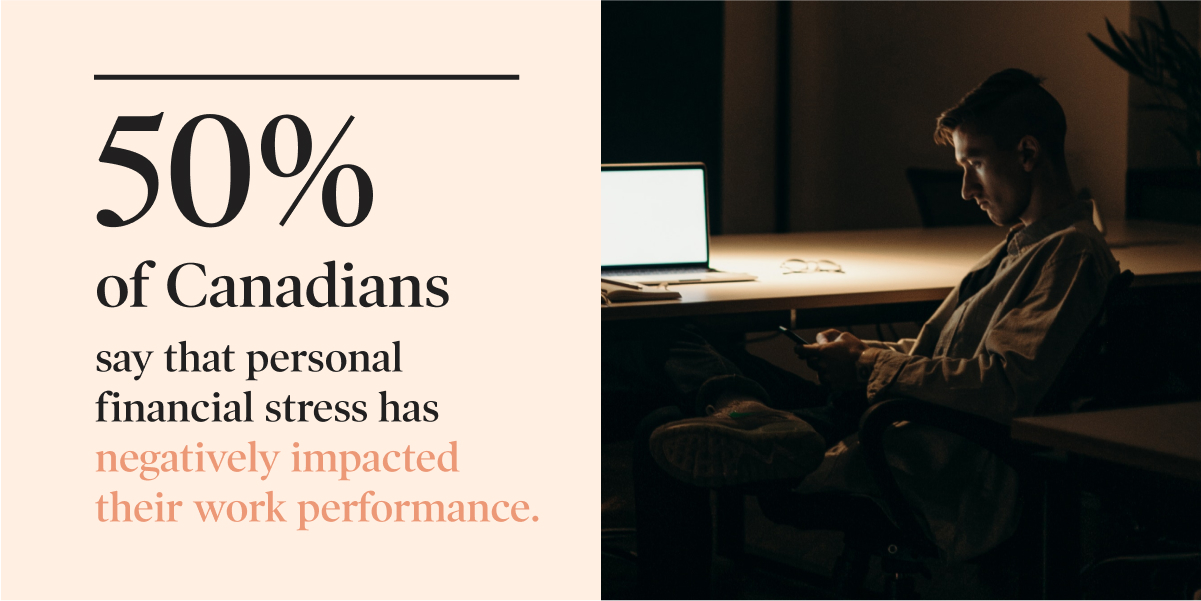Inflation. Recession. Depression. These concepts can feel daunting whether you’re financially savvy or a novice investor. But a few things are certain: your investments are plummeting, your grocery bill is unusually high, and you might be rethinking that summer road trip with gas prices through the roof.
Not only is the current economic climate affecting your wallet, but it’s probably impacting your health, too. The Financial Consumer Agency of Canada agrees that, along with physical and mental well-being, financial wellness is one of the pillars of good health.

Indeed, those dealing with financial stress are 4x more likely to experience headaches and sleep disorders. They are also:
-
At higher risk of strained family and personal relationships
-
2x more likely to suffer from overall poor health
-
At higher risk of serious illness, like heart disease, high blood pressure, and depression
For many Canadians, financial stress seeps into all facets of daily life, including work. So if you feel less focused or productive on the job, you’re not alone.

If you’re unsure how to recession-proof your finances, continue saving for the future, and prioritize your mental health, read on for our simple strategies.
1. Adapt your savings and investment strategy
Monthly savings
If you have a regular saving or investing plan in place – or if you’re planning to set one up – make sure that the amount you set aside is realistic for your current situation. Taking on debt to maintain a monthly investment plan is not ideal in difficult financial circumstances.
Investing
With any funds for which you have short- or medium-term investment horizons, consider revising your asset allocation. A relatively more conservative approach is recommended when the financial climate isn’t great.
As for the funds that are being invested for the long term (e.g., 10 years or more), keep a consistent investment approach. And remember. Don’t get too discouraged by current market conditions. If anything, see this as a cheap market entry opportunity.
2. Future-proof your finances
It may feel counterintuitive to think about the future when facing more immediate financial concerns, but a long-term plan means your finances will be much more resilient to economic uncertainty.
Prioritize paying down debt. With interest rates on the rise and shaky stock market performance, debt payment is more important than ever. Not only will it help you mitigate the ever-increasing cost of carrying debt, but it will also minimize stress and anxiety commonly linked to financial burden.
Think twice about major purchases. If the possibility of an economic downturn could threaten your job security, only make major purchases that are absolutely necessary. Make sure your purchases are ones that you’re certain you can afford, even if your worst financial outcome becomes a reality.
Focus on your career. This can help you reach an overall better financial position. Speak to your manager about certifications or courses that could help propel your growth. If possible, set aside your next bonus or extra funds from a raise to reinforce your financial safety net.
3. Manage daily stress and anxiety
Take a break from current events.
Over 63% of people report that news about financial disruptions is a significant source of stress – a number close to the 69% who said the same during the 2008 recession.
Constant exposure to the news can exacerbate existing mental health issues, or trigger past ones. For example, if you’ve experienced financial hardship, news about a volatile stock market may set off your anxiety. Learn how to set healthy boundaries in a few easy steps:
-
Select one or two news and social media apps you trust, and delete the rest.
-
Set time limits for different apps, so you’re notified when you’ve been browsing for too long.
-
Make time for hobbies and activities you enjoy away from your phone.
-
If a conversation is making you anxious, feel free to step away or politely ask to change the subject. Try saying: This is an important issue, but I’d prefer to talk about something else.
Limit how often you check your finances.
Online banking is a staple for most people, and swiping into an app is second nature. But if you're worried about the economy, this habit could amplify negative feelings. For example, even though it’s normal to see fluctuations in your long-term investments, it can still be a source of anxiety.

Consider setting up your app notifications to receive alerts for important transactions or updates. This lets you stay informed, without the constant need to check your investment performance and account balances. You can also carve out a dedicated time for money management each month, so you don’t constantly feel worried about it.
Develop coping strategies.
Anxiety-related to money can be avoided with financial education and thoughtful planning. But if you’re already feeling stressed, building resilience is much harder. Here are a few simple ways to alleviate stress, so that you can focus on financial health.
-
Improve your mood with regular physical activity, healthy eating, and quality sleep.
-
Stick to a daily routine that helps you feel connected and purposeful.
-
Practice relaxation techniques like deep breathing, stretching, and meditation.
-
Consult a financial advisor if you have any questions about your financial health.
How Dialogue can help
At Dialogue, we know that health is more than just physical. This is why we provide our members with mental health support and financial counselling through our EAP. By using our simplified app, members and their families can book virtual consultations with one of our professionals to discuss debt, mortgages, retirement planning, and other money matters, as well as stress and anxiety. By getting the support you need, when you need it, you can easily prioritize all aspects of your well-being.




 Canada (EN)
Canada (EN)
 Global (EN)
Global (EN)







